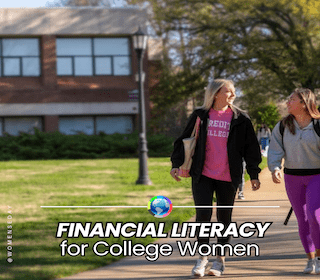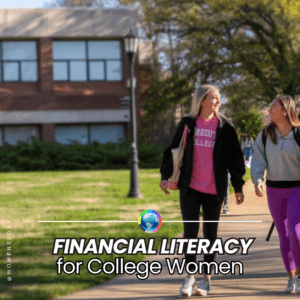Summer break offers a unique opportunity for college-aged women to enhance their financial literacy skills. With more time on your hands and fewer academic pressures, it’s the perfect season to dive into personal finance, setting a solid foundation for future financial independence. Here’s a comprehensive guide on how to make the most of your summer to learn financial literacy.
Photo by Meredith College
1. Set Clear Financial Goals
Start by setting clear, achievable financial goals. Whether it’s saving for a study abroad program, building an emergency fund, or planning a post-graduation trip, having specific targets will motivate you to stay on track. Break down your goals into short-term (within a year), medium-term (1-5 years), and long-term (5+ years) categories.
2. Create a Budget
Understanding where your money goes is the first step toward financial literacy. Use summer as a time to create a budget:
- Track Your Spending: Keep a record of your expenses for a month. Use apps like Mint, YNAB, or even a simple spreadsheet.
- Categorize Expenses: Group your spending into categories such as food, entertainment, transportation, and savings.
- Set Limits: Based on your tracking, set spending limits for each category to ensure you’re not overspending.
3. Read Financial Books and Blogs
Summer break provides ample time for reading. Here are some recommended books and blogs:
- Books: “Rich Dad Poor Dad” by Robert Kiyosaki, “Broke Millennial” by Erin Lowry, and “I Will Teach You to Be Rich” by Ramit Sethi.
- Blogs: “The Financial Diet,” “HerMoney,” and “Afford Anything.”
4. Take Online Courses
Many platforms offer free or affordable online courses on financial literacy. Consider enrolling in courses from:
- Coursera: Offers courses like “Financial Markets” by Yale University.
- Udemy: Features practical courses on budgeting, investing, and personal finance.
- Khan Academy: Provides comprehensive lessons on economics and personal finance.
5. Understand Credit and Debt
Learn how credit works and the importance of maintaining a good credit score. Here’s what to focus on:
- Credit Scores: Understand what factors affect your credit score and how to improve it.
- Credit Cards: Learn about the benefits and risks of using credit cards. Practice responsible usage by paying off the balance in full each month.
- Student Loans: If you have student loans, research the different repayment plans available and understand the implications of each.
Photo from PlanSponsor
6. Start Investing
Investing can seem intimidating, but starting small can make a big difference. Use summer to:
- Learn the Basics: Understand different types of investments such as stocks, bonds, and mutual funds.
- Open an Account: Consider opening a Roth IRA or a brokerage account to start investing. Many platforms offer student-friendly options with low fees.
- Practice: Use virtual stock trading apps to practice investing without risking real money.
7. Join Financial Communities
Engage with online communities and forums focused on personal finance. Reddit has several active subreddits such as r/personalfinance and r/financialindependence. Participating in these communities can provide valuable insights and support from others on the same journey.
8. Find a Mentor
Having a mentor can provide personalized guidance and motivation. Look for a mentor who has experience in personal finance, whether it’s a family member, professor, or professional advisor.
9. Attend Workshops and Seminars
Many organizations and universities offer workshops and seminars on financial literacy. Check out local events, or look for webinars that you can attend from the comfort of your home.
10. Practice Financial Discipline
Finally, use the summer to practice financial discipline. Challenge yourself to:
- Save Consistently: Set aside a portion of any summer job earnings or allowances.
- Avoid Impulse Purchases: Practice mindful spending by distinguishing between wants and needs.
- Reflect: Regularly review your financial progress and adjust your goals as needed.
By dedicating your summer to learning financial literacy, you’ll be better prepared to manage your finances now and in the future. The skills you acquire will empower you to make informed financial decisions, achieve your goals, and pave the way for a financially secure life. Start today, and make this summer a turning point in your financial journey.






